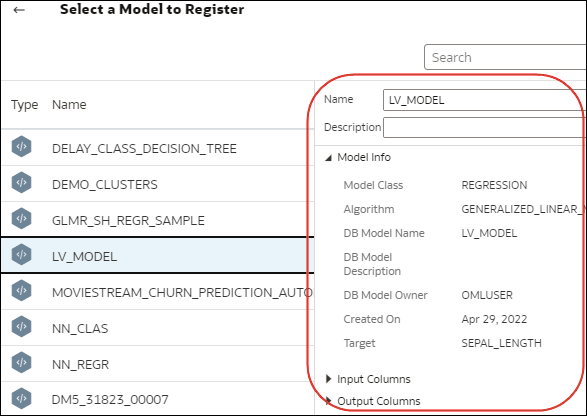Oracle Analytics mit Oracle Cloud Infrastructure Data Science integrieren
Integrieren Sie Oracle Analytics mit Oracle Cloud Infrastructure (OCI) Data Science, um Funktionen für maschinelles Lernen und künstliche Intelligenz ohne Data-Scientist-Fachkenntnisse auszuführen. Beispiel: Bei Gesundheitsdaten können Sie ein Vorhersagemodell verwenden, um Risikofaktoren zu identifizieren und das Risiko einer erneuten Einweisung von Patienten nach ihrer Entlassung vorherzusagen.
Voraussetzungen für die Integration von OCI Data Science-Modellen mit Oracle Analytics
Diese Voraussetzungen müssen für die Integration von OCI Data Science mit Oracle Analytics erfüllt sein.
- Erstellen Sie eine Verbindung zwischen Ihrer Oracle Analytics-Instanz und dem OCI-Service. Siehe Verbindung zu Ihrem Oracle Cloud Infrastructure-Mandanten erstellen.
- Speichern Sie die Modelle des maschinellen Lernens in OCI im Modellkatalog von OCI Data Science. Diese Modelle müssen mit Oracle Accelerated Data Science Software Development Kit 2.6.1 oder höher erstellt und gespeichert werden, damit sie mit Oracle Analytics kompatibel sind.
Erforderliche Policys für die Integration von OCI Data Science mit Oracle Analytics
Richten Sie die erforderlichen Sicherheits-Policys ein, bevor Sie Oracle Analytics mit OCI Data Science integrieren.
Der OCI-Benutzer, den Sie in der Verbindung zwischen Oracle Analytics Cloud und Ihrem OCI-Mandanten angeben, muss über Lese-, Schreib- und Löschberechtigungen in dem Compartment verfügen, das die gewünschten OCI-Ressourcen enthält. Stellen Sie sicher, dass der OCI-Benutzer zu einer Benutzergruppe mit den folgenden minimalen OCI-Sicherheits-Policys gehört. Wenn Sie eine Verbindung zu einem OCI-Mandanten aus Oracle Analytics herstellen, können Sie entweder einen OCI-API-Schlüssel oder einen Resource Principal verwenden.
Hinweis:
Oracle Cloud-IDs (OCIDs) sind Ressourcen-IDs, die in OCI verwendet werden.Hinweis:
Um bei Verwendung eines Resource Principals alle Analytics-Instanzen unter einem Compartment aufzunehmen, geben Sie{request.principal.type='analyticsinstance', request.principal.compartment.id='<compartmentA_ocid>'} anstelle von {request.principal.id='<analytics_instance_ocid>'} an.| API-Schlüssel-Policys | Resource Principal Policys |
|---|---|
Allow group <group_name> to read data-science-projects in compartment <compartment_name> |
Allow any-user to read data-science-projects in compartment <compartment_name> where all {request.principal.id='<analytics_instance_ocid>'} |
Allow group <group_name> to read data-science-models in compartment <compartment_name> |
Allow any-user to read data-science-models in compartment <compartment_name> where all {request.principal.id='<analytics_instance_ocid>'} |
Allow group <group_name> to manage data-science-jobs in compartment <compartment_name> |
Allow any-user to manage data-science-jobs in compartment <compartment_name> where all {request.principal.id='<analytics_instance_ocid>'} |
Allow group <group_name> to inspect instance-family in compartment <compartment_name> |
Allow any-user to inspect instance-family in compartment <compartment_name> where all {request.principal.id='<analytics_instance_ocid>'} |
Allow group <group_name> to manage data-science-job-runs in compartment <compartment_name> |
Allow any-user to manage data-science-job-runs in compartment <compartment_name> where all {request.principal.id='<analytics_instance_ocid>'} |
Allow group <group_name> to inspect virtual-network-family in compartment <compartment_name> |
Allow any-user to inspect virtual-network-family in compartment <compartment_name> where all {request.principal.id='<analytics_instance_ocid>'} |
Allow service datascience to use virtual-network-family in compartment <compartment_name> |
Allow service datascience to use virtual-network-family in compartment <compartment_name> |
Allow group <group_name> to manage log-groups in compartment <compartment_name> |
Allow any-user to manage log-groups in compartment <compartment_name> where all {request.principal.id='<analytics_instance_ocid>'} |
Allow group <group_name> to read buckets in compartment <compartment_name> |
Allow any-user to read buckets in compartment <compartment_name> where all {request.principal.id='<analytics_instance_ocid>'} |
Allow group <group_name> to manage objects in compartment <compartment_name> where target.bucket.name='<staging_bucket_name>' |
Allow any-user to manage objects in compartment <compartment_name> where all {request.principal.id='<analytics_instance_ocid>', target.bucket.name='<staging_bucket_name>'} |
Allow group <group_name> to read objectstorage-namespaces in compartment <compartment_name> |
Allow any-user to read objectstorage-namespaces in compartment <compartment_name> where all {request.principal.id='<analytics_instance_ocid>'} |
| Policy für dynamische Gruppen | Beschreibung |
|---|---|
Allow dynamic-group <dynamic_group> to read data-science-models in compartment <compartment_name> |
Bietet dem Data Science-Modell Zugriff auf den Data Science-Joblauf. |
Allow dynamic-group <dynamic_group> to manage objects in compartment <compartment_name> where target.bucket.name='<staging_bucket_name>' |
Bietet Object Storage Zugriff auf den Data Science-Joblauf. |
Allow dynamic-group <dynamic_group> to use log-content in compartment <compartment_name> |
Bietet Logzugriff auf den Data Science-Joblauf. |
Hinweis:
Verwenden Sie beim Angeben von<dynamic_group> eine Vergleichsregel mit dem Format all { resource.type='datasciencejobrun', resource.compartment.id='<compartment_ocid>' }, wobei <compartment_ocid> die Oracle Cloud-ID des Compartments mit den Data Science-Modellen ist.OCI Data Science-Modell in Oracle Analytics verfügbar machen
Bevor Sie Daten mit Oracle Cloud Infrastructure (OCI) Data Science-Modellen analysieren können, müssen Sie diese in Oracle Analytics registrieren.
